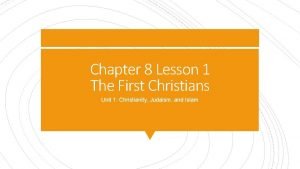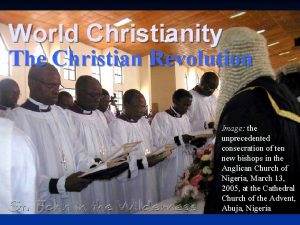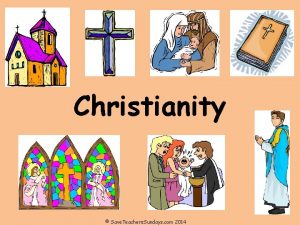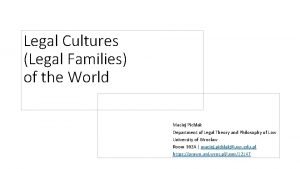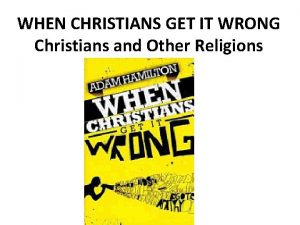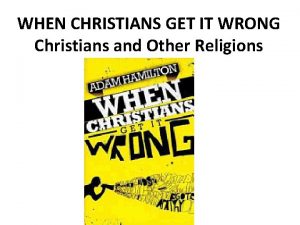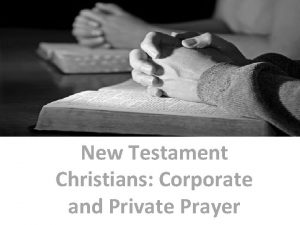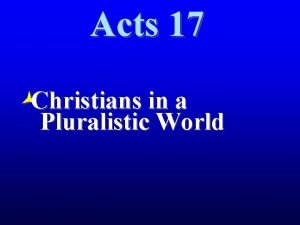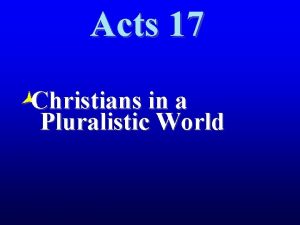Lesson 11 Christians and Denominationalism Christians and Denominationalism















- Slides: 15

Lesson 11: Christians and Denominationalism

Christians and Denominationalism I. This Subject Must Be Approached Both Carefully and Biblically. A. The subject of denominationalism is one that demands great care when addressing. B. The subject of denominationalism is one that demands Biblical truth when addressing. C. The intent of this study is to be careful in its wording and its approach, but it is the duty of all Bible students to be devoted entirely to a “Thus saith the Lord. ” D. The design of this study is to answer some key questions relating to denominationalism.

Christians and Denominationalism II. What Are Denominations? A. The word “denomination” is defined generally as… B. The word “denomination” is defined religiously as… C. In its general meaning, “denomination” indicates separating or dividing by name into various groups or sections. D. In its religious meaning, “denomination” indicates separating or dividing by name into various religious groups or sections, based upon differing beliefs and practices. E. Thus far, we are merely trying to define and understand the term.

Christians and Denominationalism III. Where Did Denominations Originate? A. Consider this thought for a moment (to be developed more fully in subsequent points)… B. The Catholic church was established in the early seventh century (around 606 A. D. ), almost 600 years after the establishment of the church in the New Testament. C. Protestant denominations began to be established in the early sixteenth century, almost 1, 500 years after the establishment of the church in the New Testament. D. Hundreds, if not thousands, of denominations have been formed in the last 500 years. 1. The origin of each denomination since Pentecost is exactly the same: human.

Christians and Denominationalism IV. Are Denominations Acceptable to God? A. The Lord prophesied of HIS coming church for centuries. B. The Lord promised to build HIS church. C. The Lord established HIS church on Pentecost in A. D. 33. D. The Lord clearly affirmed that He has ONE church. E. The Lord revealed His eternal plan (called “the mystery”) that all believers (including Jews and Gentiles) would be in “the SAME body, ” HIS church. F. Sadly, the Lord predicted an apostasy from HIS truth and from HIS church.

Christians and Denominationalism IV. Are Denominations Acceptable to God? G. As one surveys the modern scene of denominational divisions and multiple “churches, ” he must come to realize that such is entirely inconsistent with God’s original plan! H. Denominationalism is unacceptable to God because it violates Jesus’ prayer for unity (John 17: 20 -23). I. Denominationalism is unacceptable to God because it violates the Holy Spirit’s command for unity (1 Cor. 1: 10). J. Denominationalism is unacceptable to God because it violates God’s nature (1 Cor. 14: 33).

Christians and Denominationalism IV. Are Denominations Acceptable to God? K. Denominationalism is unacceptable to God because it produces unbelievers (John 17: 21). L. Denominationalism is unacceptable to God because it teaches doctrines that are contrary to the teaching of the New Testament (Gal. 1: 6 -9). M. Consider this simple point: the word “denomination” is not found in the Bible.

Christians and Denominationalism V. Are There Faithful Christians in Denominations? A. The fact has been established that there were no denominations in the first century. B. Defining terms is helpful and even vital in answering a Bible question like this one. The key term to properly define is the word “Christian. ” 1. People have many different ideas of what a “Christian” is. 2. The word “Christian” is found three times in the N. T. 3. A “Christ-ian” is one who is “of or belongs to” Christ.

Christians and Denominationalism V. Are There Faithful Christians in Denominations? C. The very way that one becomes a “Christ-ian” (belonging to Christ) is the very same way that one becomes a part of Christ’s church. 1. As a penitent believer, one is… 2. Following these steps… 3. These are the same steps followed by individuals in N. T. times. 4. The steps of salvation taught by denominations and the steps to become a part of a denominational group are NOT the steps taught in the New Testament. D. When one “becomes” a “Christian” and takes on the name of “Christ, ” the Lord expects him to live faithfully to that name.

Christians and Denominationalism V. Are There Faithful Christians in Denominations? E. Answering this question is not a judgment against the sincerity of someone’s heart. F. When we go back to the Bible, we find: 1. Who is truly a Christian in the eyes of God (i. e. , a penitent believer who is baptized for the express purpose of obtaining the forgiveness of sins). 2. What church God places Christians within (i. e. , the church that Jesus built). G. If we seek to justify a “plan of salvation from sins” that is not in accordance with the New Testament, or if we seek to justify a “church” that is not the one that Jesus established in the New Testament, we are preaching “a different gospel” (cf. Gal. 1: 6 -9).

Christians and Denominationalism VI. Should Christians or Churches of Christ Extend Fellowship to Denominations? A. Let’s first define “extend fellowship. ” B. Remember these crucial points of emphasis in the New Testament. C. There is a sweet “fellowship” that those who “walk in the light” of the gospel of Christ have with God and with fellow believers (1 John 1: 3 -7). D. It has been established that… E. Thus, it should not surprise us that the Bible issues clear warnings and censures to God’s people to not extend fellowship to denominations.

Christians and Denominationalism VI. Should Christians or Churches of Christ Extend Fellowship to Denominations? F. The Bible teaches that fellowship with God is conditional. G. The Bible teaches that Christians are to have no fellowship with those in error. H. The Bible teaches that extending fellowship is joining in with them in their error. I. The Bible teaches that Christians are to avoid those who live or teach contrary to God’s truth. J. While to some it may seem completely harmless (and could even be worthwhile) to extend fellowship to denominations, Scripture is not unclear in the Christian’s responsibility to maintain definite lines between truth and error.

Christians and Denominationalism VII. What Is the Appropriate Response of Christians to Denominationalism? A. The Christian’s responsibility toward denominationalism as a whole and toward specific denominational groups and toward members of denominations can be summarized in the words of Ephesians 4: 15 – “speaking the truth in love. ” 1. We must maintain a spirit of love and compassion. 2. We must stand for, hold to and speak forth truth. B. With a spirit of love and compassion, Christians must stand relentlessly opposed to all man-made religion, man-made churches and man-made doctrines! C. Christians need to realize that the Lord’s church is not in competition with denominations.

Christians and Denominationalism VIII. We Must Recognize the Seriousness of Denominationalism. A. Consider these Scriptural observations about the eternal condition of denominationalism. B. Consider these logical observations about denominationalism. C. Denominationalism cannot be defended logically. D. Denominationalism cannot be defended Scripturally.

Christians and Denominationalism IX. Let’s Go Back to the Bible and Restore the Church of the N. T. ! A. From our study of God’s Word, it is apparent that denominationalism… B. From a study of the New Testament, it should be apparent that: 1. The Lord established His church on the day of Pentecost in Acts 2. 2. His church was neither Catholic, Protestant nor Jew. 3. The Lord’s church was not a denomination—it was not Catholic, Lutheran, Presbyterian, Baptist or Methodist! 4. First-century Christians were not Catholics, Lutherans, Presbyterians, Baptists, Methodists, etc. ! 5. Denominationalism was completely unknown when the church began. C. In the New Testament, when honest seekers of truth heard the pure gospel taught… D. Let us go back to the Bible and restore New Testament Christianity.
 Denominationalism in the bible
Denominationalism in the bible Lesson 1 the first christians
Lesson 1 the first christians Protestant and catholic
Protestant and catholic Number of christians in the world
Number of christians in the world How christians dress
How christians dress Where do the most christians live
Where do the most christians live Military expeditions carried out by european christians
Military expeditions carried out by european christians Why christians should not celebrate halloween
Why christians should not celebrate halloween When christians get it wrong
When christians get it wrong India christians laws
India christians laws First called christian
First called christian Christians ö
Christians ö When christians get it wrong
When christians get it wrong Colosse 12
Colosse 12 Ubermensch
Ubermensch Why did romans treat christians so badly?
Why did romans treat christians so badly?

